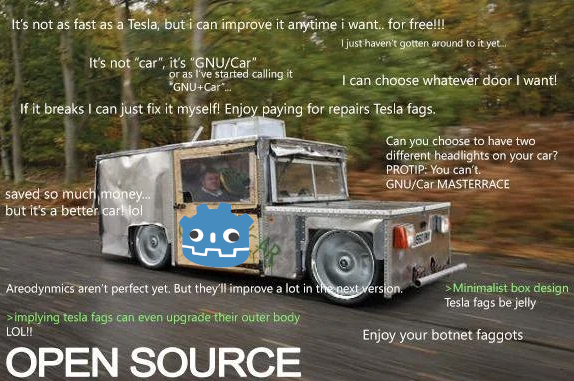Freedom
Godot is declared as free and open-source software (FOSS). That means you have the freedom to run, copy, distribute, study, change and improve Godot by contributing to its development. Software freedom aside, Godot’s leadership propagates the idea of freedom as the pivotal principle of Godot’s purported success.
Those who’ve been immersed in their fair share of Open Source shenanigans might ironically resonate with these memes, sarcastically tailored for Godot, because, of course, we revel in our freedom to do so! 🙃

Freedom to improve
Here’s how the lead developer of Godot presents it to the public: a picture of the open ocean with the word “Freedom”1:

Will clarify this as many times as needed:
Godot is not a company, it’ s FOSS, volunteer based. No one tells anyone want to do. Contributors work on what they want, whenever they want. There is no resource allocation, no central authority ordering people around.
It’s odd how Juan consistently feels the need to “clarify” this. What’s the deal with that? Godot isn’t particularly exceptional when it comes to software freedom compared to other FOSS projects. So, why does Juan keep emphasizing it so vividly, almost as if he’s attempting to convert users and contributors into some kind of religious following?
If contributors expect their improvements to be integrated into the main project, they cannot opt to work on features not initially approved by Godot’s leadership. It operates in a manner similar to companies, but with a key distinction—99% contributors are unpaid, unlike in a corporate setting. If this is meant to symbolize freedom, what kind of freedom are we really discussing in a project that touts itself as community-driven?
Freedom to change
Even if we set aside the contribution process in Godot, the freedom to modify Godot is undeniably an advantage. However, there are other factors to consider. When you ask Godot users about the advantages they see in Godot compared to other alternatives, the most common response is usually: “It’s free!” This benefit is overemphasized by Godot users, and the need for software modifications tends to be contrived, because in reality, most Godot users, who are predominantly hobbyists, don’t really need to build Godot from source.
Certainly, there are advanced use cases that require rebuilding Godot from source. Considering the significant limitations in customization capabilities within Godot, it’s highly probable that professional developers would indeed need to build Godot from source themselves.
However, for some reason, those waiting for Godot seem to believe that the freedom to modify the engine is the most crucial aspect, almost as if freedom itself is an inherent feature of Godot2:
Comment
byu/itsarabbit from discussion
ingamedev
The issue with this misguided sense of empowerment, expressed as “it’s open-source, so I can do anything I need myself, the possibilities are endless!” is that, in many cases, you may not know how to do it yourself. This means spending a significant amount of time learning how to develop the desired feature, compared to someone who already possesses the skills to do so.
Consequently, in many instances, it may actually be more cost-effective to purchase an existing commercial solution, even if it’s closed-source, which is likely better than anything waiters for Godot could create themselves.
Freedom of interpretation?
The simplified architecture or lack of some essential features is not just “the engine has not matured yet” or “just wait for it”, a rhetoric that you may hear from fervent waiters for Godot. The problem is that a lot of people don’t actually know what kind of approach Godot follows, so they tend to project whatever vision of their own perfect game engine onto Godot, basically creating a bubble.
If we explore the origins of the “Godot” name, as you’ve hopefully discovered in the Value of Waiting chapter, it frankly reveals the core approach undertaken by Godot’s leadership. This kind of freedom of interpretation concerning Godot’s purpose is certainly not something to aspire for.
Freedom to make conclusions 🙂
Due to all above, you may find yourself working on a tool rather than working on your dream using a tool. Therefore, you either pay with money, or your work. Time is expensive. Even as a proponent of free software myself, I say that there’s no such thing as freedom in this particular context, I think it’s a myth when we talk about maintenance and support specifically.
To make an analogy: it’s like apartment renovation. You either do it yourself (long), or you hire professionals to do this job. Neither is totally free or effortless. The problem is that most Godot followers think that their engine offers them the ultimate freedom that will liberate them from all the hard work. Not at all. With open-source, you’re all on your own, and it’s equally demanding.
In the upcoming chapters, you’ll find that the Godot leadership sees contributors as a means to an end rather than an end in themselves. The decision-making process is only allowed under specific conditions, based solely on trust, without consideration for merit or even the do-ocracy, a default governance model prevalent in many Open Source projects.
References
Godot is FOSS, volunteer based - By Juan Linietsky, Twitter.
Godot is better for AAA than Unity, because it’s open-source - Comment at Godot subreddit.